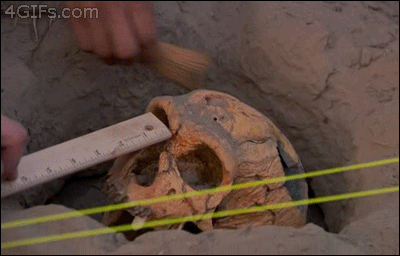Explore the world, one post at a time
Anthropology - Blog Posts
Why do in so many cultures brides have their faces covered during the wedding?

My first illustration-100 project! The assignment was to do a black and white editorial piece and I did mine on “How wielding lamps and torches shed a new light on Stone Age cave art” published by Science News

日本の考古学と科学思想の歴史。 第3章 : 日本の考古学者の皆さん、哲学的観点から見た新しい日本考古学へようこそ。 - 1868年当時、日本にはヨーロッパやアメリカで見られるような科学的根拠はありませんでした。日本がその精神やその一部を開放したのは、1868年から1869年の戊辰戦争後になります。米国のような国は日本の科学をモデルにするだろうから、非常に保守的だった。 日本で骨董品への関心が芽生えたのはいつ頃ですか? 江戸時代にはすでに骨董品への関心があったことが知られており、はるか昔にヨーロッパでも同様のことが起こりました。 日本の発掘の始まりは19世紀のほぼ終わりに始まり、数年前に日本でいくつかのローマ硬貨が発見されました。どうやら日本の封建領主は古遺物を収集するのが好きでした。おそらくそれらは中国のどこかの港から海岸に到着しました。日本語。 - 過去を知りたいという欲求は、どの大陸に属していても、すべての人類に共通のものであり、問題の時代についても同じことが言えます。 ヨーロッパやアメリカの様々な勢力が日本に到来したとき、彼らはその住民に影響を与えました。そのため、日本人によって日本考古学の父と考えられているエドワード・モースを、他の登場人物の中でも特に取り上げています。 19 世紀には、アメリカ哲学の最も偉大な学派の 1 つであるテイラー主義があり、これは台湾で考古学的発掘を行い、中国および韓国との関係を確立する日本の考古学の最も偉大な人物の 1 人である鳥居龍蔵に影響を与えることになります。 - 気に入っていただければ幸いです。今後の投稿でお会いしましょう。良い一週間をお過ごしください。 - HISTORY OF JAPANESE ARCHEOLOGY AND SCIENTIFIC THOUGHT. Chapter 3 : Welcome, Japanesearchaeologicalists, to a new installment of Japanese archaeology, seen from a philosophical point of view. Having said that, get comfortable and let's begin. - In 1868 Japan did not have a scientific base per se as we can see in Europe or the United States, it will be after the Boshin War of 1868-69 when Japan opened its mentality or part of it, since a good part of the population was very conservative because Countries like the United States would model Japanese sciences. When did interest in antiques arise in Japan? It is known that in the Edo period there was already interest in antiquities, something similar happened in Europe a long time ago. The beginning of the Japanese excavations began almost at the end of the 19th century, a few years ago some Roman coins were discovered in Japan, apparently a feudal lord in Japan liked to collect antiquities, they probably arrived from some port in China to the coasts Japanese. - The desire to know the past is something that all human beings share, no matter what continent you belong to and the same can be said about the era in question. When the different powers from Europe and the United States arrived in Japan, they influenced its inhabitants, thus we have, among other characters, Edward Morse, considered by the Japanese, the father of Japanese archaeology. During the 19th century we have one of the greatest schools of American philosophy, Taylorism, which will influence one of the greatest figures of Japanese archeology Torii Ryūzō who will carry out archaeological excavations in Taiwan, establishing relations with China and Korea. - I hope you liked it and see you in future posts, have a good week.
NEXT ONE
"Speak of the wolf and the wolf is (coming) into the house" (Про вовка промовка а вовк і в хату) This is literally the "Speak of the devil" but with with a wolf. People don`t even use the second part about the house. They just say: "Speak of the wolf". Perhaps comes from long gone supestitions of not mentioning dangerous animals as if to not "manifest" them coming to you. Its literally the reason the original word for Bear is lost. People genuinely were afraid to call the dangerous beast by it`s name, replacing it will nicknames.
There is a saying in Ukrainian: "Tell an idiot to pray and he`s gonna smash his head" (Скажи дурню молитися і він голову розіб'є). Sometimes you can just say the firs half since everyone already know the second one. It comes. Context is It comes from the tradition of bowing/kneeling during prayer. And it can have two meanings:
No matter how easy, simple or straightforward the task is, a stupid person will still find a way to screw it up...somehow. Kinda like the phraze "You had ONE job, dude!"
No matter how healthy, constructive, well-intentioned, moral, wize, demure or logical the idea/cause/midset, an idiot will still find a way to either: a) completely misunderstand/distort it/miss the entire point....and screw it up, or b) go copletely overboard with no measure....and screw it up
This isn`t even related to anything specific in my life or on the internet, i just REALLY REALLY wanted to share some cool sayings/idioms from my language. Maybe language and folklore nerds will like it. Maybe writers and worldbuilders will get some cool inspiration for the way characters speak. Maybe i will just spread the good will of funny shit in my language and culture. I will post some more of these






